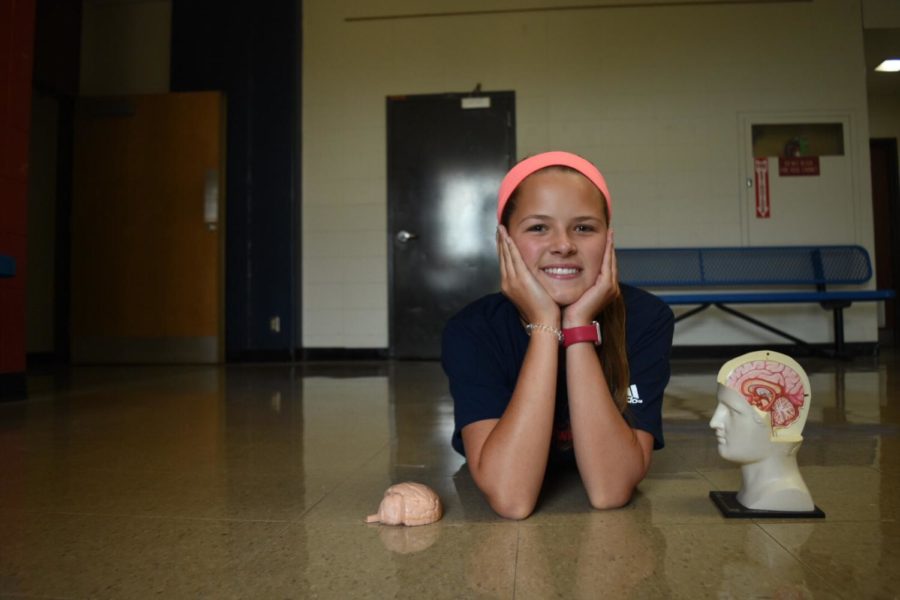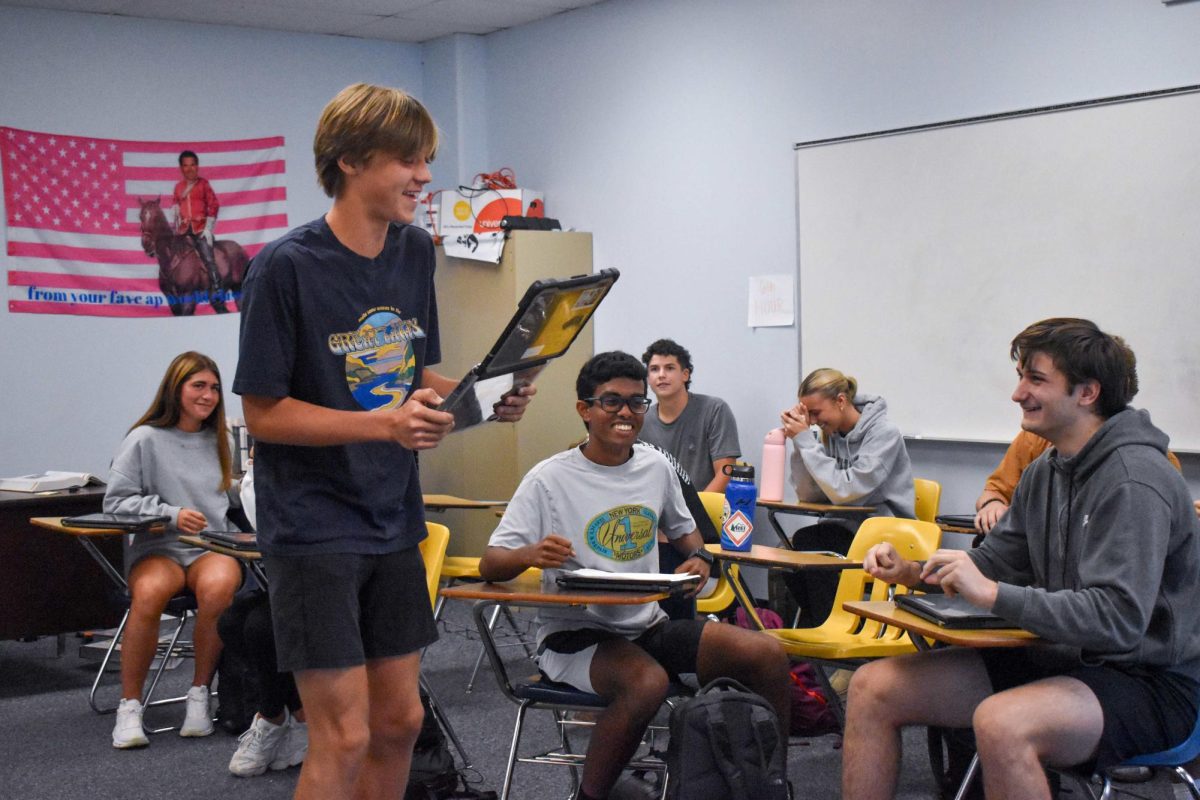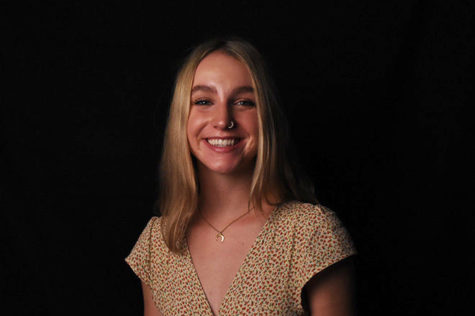As her body begins to shake, 9-year-old Giselle Bauer tastes rotten blueberries. Her head begins to ache and her face begins to twitch. She feels a flash.
Three weeks later, Bauer–now a freshman–learned this “flash” was actually a seizure.
“The flashes felt really weird,” Bauer said. “The doctors were showing me a picture of a normal brain compared to mine. They explained how I had a tumor, which was causing the seizures. At the time, I had no idea what I was in for.”
Along with having a tumor,¬ÝBauer was born with Optic nerve hypoplasia, a congenital condition that causes vision impairments.
‚ÄúI had an MRI when I was a few months old because I was having problems with my eye. When they first found out I had a tumor, they looked back at that MRI and found that I had the tumor back then, but it was a lot smaller,‚Äù¬ÝBauer said.
Bauer¬Ýtried medication, but it did not stop her seizures. Two months later, she underwent her first brain surgery to remove the tumor from her temporal lobe. They¬Ýremoved the tumor as well as her right hippocampus, amygdala, insula and uncus, but soon found out that they did not remove all of the tumor. This surgery caused Bauer to have to control her emotions and facial expressions manually.
‚ÄúI [now] have to tell myself to do facial expressions,‚Äù¬ÝBauer said. ‚ÄúMy brain doesn‚Äôt automatically smile or laugh like everyone else. I have to actually tell myself to smile. With this, I have to constantly remind myself to convey my reactions using words, just in case my facial expressions¬Ýare not being received the way that I intend for it to be. Along with this, I also lost my memory.‚Äù
After the initial surgery, Bauer’s brain had to “remap” the way it functioned and reached stores memories. Because of this, storing short-term memories is difficult, which means that she has to find different ways to learn than her classmates.
‚ÄúI have to study more often and find special ways to remember school skills rather than using the standardized concrete method of memorizing,‚Äù¬ÝBauer said. ‚ÄúI also forget things easily, so sometimes I don‚Äôt remember certain tasks I need to do.‚Äù
Although memory is a challenge for Bauer, she found strategies to cope.
‚ÄúWhen something specific happens that I don‚Äôt think I will remember, I write down what happened in a journal,‚Äù¬ÝBauer said. ‚ÄúI also like to take a lot of pictures to capture the moments.‚Äù
The doctors suggested she have an additional surgery. They drilled holes into her head and put wires and bolts through them to track where the seizures were coming from. This caused her to miss the whole first week of school.
‚ÄúIt was harder than I thought because that is the time when you get to know the teachers and when you are first introduced to the materials and topics that the course will cover,‚Äù¬ÝBauer said. ‚ÄúAt the same time, I wasn‚Äôt allowed to leave the room at all. The electrodes in my head were tethered to the wall in order to be able to record my brain waves. That aspect of the surgery was challenging because it was very easy to get ‚Äòcabin fever‚Äô very quickly.‚Äù
With the information the doctors collected, they decided that¬ÝBauer was going to have another surgery.
‚ÄúThe most recent surgery I had was in 2016. They drilled a quarter-sized hole into my head and used a laser to ablate the tumor,‚Äù¬ÝBauer said. ‚ÄúI still have some of the tumor left, but I don‚Äôt get seizures as often anymore.‚Äù
Four surgeries in,¬ÝBauer has decided to take a break because of the risk factors.
‚ÄúUntil there is better science and technology, I‚Äôm not going to get another surgery because there’s scar tissue along the tumor and it‚Äôs hard for them to tell the difference between them,‚Äù¬ÝBauer said. ‚ÄúIt’s really risky. If they hit it a certain way it can paralyze me. I still have seizures, but they‚Äôre not as frequent because the tumor is smaller now.‚Äù
For safety,¬ÝBauer has an MRI once every year to make sure the tumor does not worsen.
“If they start noticing anything that doesn’t seem right, I will have to get them more often,” Bauer said. “If I can go another year without having too many problems, then I’ll start having MRI’s once every other year instead.”
Bauer¬Ýhas found ways to defeat her daily struggles. ¬Ý¬Ý
‚ÄúEven though some things are harder, I know I can function normally,‚Äù¬ÝBauer said. ‚ÄúI try to forget my tumor‚Äôs there and know that I‚Äôm just the same as everyone else.‚Äù



![Freshman Daphne Stokes looks at a table with Veterans Day flyers and information on Nov. 11. Stokes, along with other West High students, like senior Alexander Lewinski, passed by the table in the cafeteria with army recruitment information and giveaways for students to observe during lunch. “Talking with [the recruiters] has definitely helped me [find] where I wanted to go, more than anything else,” Lewinski said.](https://pwestpathfinder.com/wp-content/uploads/2025/11/DSC_1227-2-1200x800.jpg)
![Helping a customer, print room assistant Gretchen Williams operates her booth at the West High Craft Fair from Oct. 25-26. This was Williams’ first time participating in the Craft Fair with her new craft shop, Gs Beaded Boutique. “People have always said, over the years, ‘you should open something.’ [I replied that] I would rather just make [my crafts as] gifts for people. I just started [the online store] up, and it's been okay. I'm always surprised [by] how many views I get and [the] people from different states buying things; somebody from Alaska bought something the other day.”](https://pwestpathfinder.com/wp-content/uploads/2025/11/DSC0451-2-1200x799.jpg)
![Gesturing toward the club’s name on the board, Global Youth Aid co-president year Daniah Alsagheer discusses upcoming service projects with members during a meeting on Oct. 30. “We might be one club at one school, but together, we’re [part of] something much bigger,” Alsagheer said.](https://pwestpathfinder.com/wp-content/uploads/2025/11/DSC00949-1200x800.jpg)
![Focused on providing exceptional service, sophomore Darsh Mahapatra carefully cleans the door of a customer’s car. Mahapatra has always believed his customers deserve nothing less than the best. “[If] they’re trusting us with their car and our service, then I am convinced that they deserve our 100 percent effort and beyond,” Mahapatra said.](https://pwestpathfinder.com/wp-content/uploads/2025/10/DSC_0018-1200x800.jpg)
![Sophomore Aleix Pi de Cabanyes Navarro (left) finishes up a soccer game while junior Ava Muench (right) warms up for cross country practice. The two came to Parkway West High School as exchange students for the 2025-2026 school year. “The goal for the [exchange] program is to provide opportunities for both Parkway students and our international exchange students to learn about other cultures, build connections and become confident, capable, curious and caring — Parkway’s Four C’s — in the process,” Exchange Program Lead Lauren Farrelly said.](https://pwestpathfinder.com/wp-content/uploads/2025/10/Feature-Photo-1200x800.png)

![Gazing across the stage, sophomore Alexis Monteleone performs in the school theater. The Monteleone family’s band “Monte and the Machine” has been releasing music since 2012, but Alexis started her own solo career in 2024 with the release of her first single, Crying Skies. “My whole family is very musical, [and I especially] love writing [songs with them],” Monteleone said.](https://pwestpathfinder.com/wp-content/uploads/2025/09/DSC7463-1200x798.jpg)
![Amid teaching a lesson to her AP Calculus BC class, Kristin Judd jokes alongside her students in their funny remarks. Judd has always enjoyed keeping the mood light in her classroom, along with on the volleyball court. “[I enjoy] that side talk where you see [or] overhear a conversation and chime in, or somebody says something funny,” Judd said.](https://pwestpathfinder.com/wp-content/uploads/2025/09/image-1200x730.jpg)
![Eyeing the ball, junior Ella McNeal poses for her commitment pictures at Clemson University. McNeal’s commitment comes after months of contact with top Division 1 soccer programs. “ It has taken a lot to get to where I am, but I know that [what] I've already been through is just the beginning, and I can't wait for what is to come,” McNeal said.](https://pwestpathfinder.com/wp-content/uploads/2025/09/IMG_4926-1200x900.jpeg)

![Sophomore Shree Sikkal Kumar serves the ball across the court in a match against Lindbergh. Sikkal Kumar has been a varsity member of the varsity girls’ tennis team for two years, helping her earn the number two rank in Class 2 District 2.“When matches are close, it’s easy to get nervous, but I [ground] myself by[staying] confident and ready to play,” Sikkal Kumar said.](https://pwestpathfinder.com/wp-content/uploads/2025/11/DSC2801-1200x798.jpg)
![Dressed up as the varsity girls’ tennis coach Katelyn Arenos, senior Kate Johnson and junior Mireya David hand out candy at West High’s annual trunk or treat event. This year, the trunk or treat was moved inside as a result of adverse weather. “As a senior, I care less about Halloween now. Teachers will bring their kids and families [to West’s Trunk or Treat], but there were fewer [this year] because they just thought it was canceled [due to the] rain. [With] Halloween, I think you care less the older you get,” Johnson said.](https://pwestpathfinder.com/wp-content/uploads/2025/10/DSC00892-1-1200x800.jpg)
![Leaning on the podium, superintendent Melissa Schneider speaks to Parkway journalism students during a press conference. Schneider joined Parkway in July after working in the Thompson School District in Colorado. “My plan [to bond with students] is to get things on my calendar as much as possible. For example, being in [classes] is very special to me. I am trying to be opportunistic [meeting] kids [and] being in [the school] buildings. I have all the sports schedules and the fine arts schedules on my calendar, so that when I'm available, I can get to them,” Schneider said.](https://pwestpathfinder.com/wp-content/uploads/2025/09/IMG_5425-1200x943.jpeg)

![Leaping through the air, senior Tyler Watts celebrates his first goal of the season, which put the Longhorns up 1-0 against the Lafayette Lancers. Watts decided to play soccer for West for his last year of high school and secured a spot on the varsity roster. “[Playing soccer for West] is something I had always dreamed of, but hadn’t really had a good opportunity to do until now. It’s [really] fun being out [on the field], and I’m glad I decided to join the team. It’s just all about having fun with the boys and enjoying what time we have left together,” Watts said.](https://pwestpathfinder.com/wp-content/uploads/2025/09/DSC_1951-1200x855.jpg)

![Shifting global trade, President Donald Trump’s tariffs are raising concerns about economic stability for the U.S. and other countries alike. “[The tariffs are] going to pose a distinct challenge to the U.S. economy and a challenge to the global economy on the whole because it's going to greatly upset who trades with who and where resources and products are going to come from,” social studies teacher Melvin Trotier said.](https://pwestpathfinder.com/wp-content/uploads/2025/05/MDB_3456-1200x800.jpg)

![Pitching the ball on Apr. 14, senior Henry Wild and his team play against Belleville East. Wild was named scholar athlete of the year by St. Louis Post-Dispatch after maintaining a high cumulative GPA and staying involved with athletics for all of high school. “It’s an amazing honor. I feel very blessed to have the opportunity to represent my school [and] what [it] stands for,” Wild said.](https://pwestpathfinder.com/wp-content/uploads/2025/05/unnamed-6-1200x714.jpg)
